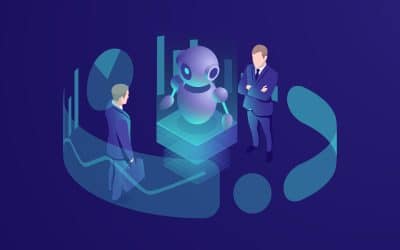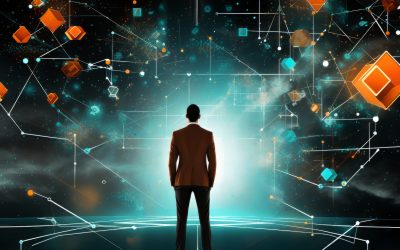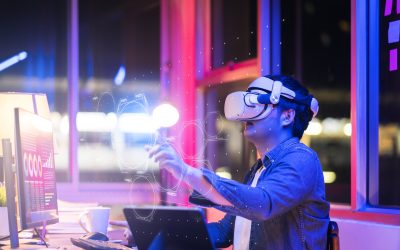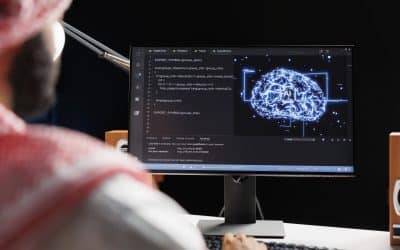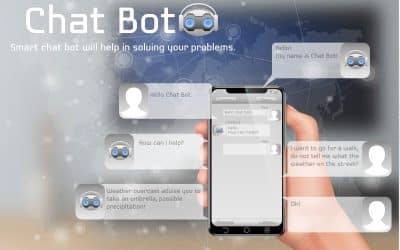In the manufacturing world, AI-powered technology is transforming operations, increasing efficiency, and creating new levels of efficiency. Traditional manufacturing processes typically involve repetitive tasks prone to human mistakes and inefficiency. But, thanks to AI, manufacturing processes are transforming toward automated and intelligent decision-making. In conjunction with robotics and IoT devices, AI algorithms can streamline production lines, decreasing downtime and increasing overall efficiency.
One major use of AI for manufacturing involves predictive maintenance. Through the analysis of the data from sensors in real-time, AI systems can predict malfunctions in equipment before they occur, which allows proactive maintenance and avoids expensive downtime. Furthermore, AI-driven quality assurance systems can detect imperfections with greater precision and consistency than human inspectors, ensuring the quality of the product and reducing loss.
Additionally, AI is optimizing supply chain management in manufacturing through forecasting demand, maximizing the level of inventory, and increasing logistics processes. With machine learning algorithms, manufacturers are able to analyze the past, trends in markets as well as external factors to make informed decisions which results in cost savings and increased satisfaction of customers.
In the end, AI-powered automation is changing the way manufacturing is conducted through the development of agile, flexible and effective production processes. As companies embrace these innovations, they get an advantage in the global marketplace which is driving innovation and acceleration of the digital transformation process.
Artificial Intelligence Powered Automation in Manufacturing
Artificial Intelligence solutions have quickly emerged as a transformative force throughout different industries, rapidly changing traditional methods and accelerating innovations. Utilizing sophisticated algorithms, machine-learning techniques, and massive data sets, AI is revolutionizing how companies operate, interact with their customers, and make crucial choices. This revolution in technology isn’t limited to one specific sector but extends across many sectors, from manufacturing and healthcare to retail, finance, and much more.
Its potential AI is in its capability to streamline mundane tasks, gain important insights from data, and increase productivity and efficiency at a level never before previously seen as businesses embrace AI-driven strategies that are allowing them to unlock new growth opportunities as well as generating cost savings and improving their competitive position in the global market.
However, with these advances come ethical concerns and issues that must be tackled to ensure responsible AI deployment. In this study, we look at how AI is changing industries and influencing the future of society and work.
The introduction of AI in healthcare is bringing about the dawn of a new age in diagnosis and treatment as well as patient care. From analysis of medical images to personalised treatment suggestions, AI is revolutionizing various aspects of healthcare delivery with unprecedented levels of precision and effectiveness.
One of the biggest technological advances brought about through AI is in the interpretation of medical images. AI algorithms based on massive databases can analyse radiological images like X-rays MRIs and CT scans with astonishing precision, assisting doctors in identifying abnormalities and diagnosing problems in the early stages. This helps in accelerating diagnosis, but also improves outcomes through prompt intervention.
Furthermore, AI-driven predictive analysis transforms healthcare by predicting the progression of disease as well as identifying high-risk patients and improving treatment strategies. Through the analysis of EHRs as well as other data about patients, AI software systems can stratify groups of patients based on their probability of developing certain diseases which allows healthcare providers to better allocate resources and adapt interventions to specific requirements of patients.
Furthermore, AI-powered chatbots and health assistants can improve patient engagement and accessibility to medical care. These systems are intelligent enough to identify ailments, provide medical advice, and set up appointments, thus reducing the strain on healthcare professionals and enhancing access to healthcare overall.
In the end, the use with AI in healthcare has enormous potential to improve diagnostic accuracy and improving patient outcomes and improving efficiency across the health care continuum. As AI develops and improve, its impact on the delivery of healthcare is expected to be substantial leading to an era of precision medicine as well as personalized healthcare.
Artificial Intelligence in Financial Services: Predictive Analytics
The industry of financial services is going through a major transformation driven by the advent technology such as artificial intelligence especially in the field of predictive analytics. Through the use of advanced algorithms for machine learning and massive data-driven analytics, institutions will be able to discover valuable insights, minimize risks, and enable more informed decisions across a variety of areas.
One of the main uses to use AI for finance involves risk management. Artificial intelligence-powered models for predictive analytics are able to evaluate the risk of market risk, credit risk as well as operational risks with higher precision and accuracy than conventional methods, allowing banks to anticipate and reduce the risk for their businesses.
In addition, AI is revolutionizing fraud detection and prevention in the field of financial services. Through the analysis of patterns and anomalies in transaction data live time, AI systems can detect fraud with high-precision and help organizations fight financial crimes and protect their assets.
Furthermore, AI-powered chatbots as well as virtual assistants have been increasing customer support and service in the financial sector. These AI-driven systems are able to deal with routine questions, provide customized suggestions, and speed up the onboarding process for customers and improve the customer’s engagement and satisfaction.
Overall, the introduction of AI in the financial sector has been boosting efficiency in operations, increasing capability to manage risk, and making the customer experience better. As banks continue to adopt technology powered by AI, they will be able to increase their competitive advantage in a more complicated and ever-changing market.
Bettering the Customer Experience through Artificial Intelligence for Retail
In the retail space AI is changing how customers experience shopping, enabling personalization and improving efficiency of operations. In everything from virtual assistants to recommendation engines AI-powered solutions are changing the way retailers interact with customers and provide value at many points of contact.
One of the main uses that AI can make use of AI for retail lies personalizing recommendations. Through the analysis of customer data such as purchase history, purchase history, and browsing habits, AI algorithms can predict specific preferences of each customer and tailor suggestions to meet the specific needs of each customer’s preferences and preferences, improving the shopping experience and increasing sales.
Additionally, AI-driven chatbots as well as virtual assistants are changing customer support and service in the retail sector. These AI-driven systems can help customers with queries, provide details about the product, and aid in transactions, thus reducing the load of human service personnel and enhancing overall efficiency.
In addition, AI is optimizing inventory management and supply chain operations in the retail industry. By anticipating demand, predicting trends and optimizing the level of stocking, AI systems can help retailers limit stockouts, cut down on overstocking, and increase the rate of turnover of inventory, thus maximising profits and reducing loss.
In addition, AI-powered visual searching technology is improving the shopping experience on the internet by allowing shoppers to search for products by using images instead of text. This makes the process easier and allows customers to locate items that meet their needs quicker and more precisely.
Overall, the introduction with AI into retail operations is bringing substantial improvements in customer experience as well as operational efficiency and competitive advantages. While retailers work to leverage the potential of AI they will be able to open new avenues for growth and development in and the increasingly data-driven and digital environment.
In the field of agriculture, AI has revolutionized conventional farming practices, resulting in efficiency in productivity, sustainability, and sustainability. With the help of AI-powered technologies, farmers are able to make informed decisions, improve the allocation of resources, and reduce environmental impacts, thus changing agriculture’s future.
One of the most important uses that AI can be used for is AI to assist farmers is precision farming. Through the analysis of data collected by drones, sensors and satellite images, AI systems can provide farmers with insight into the health of soils as well as crop growth and pests, allowing farmers to modify their farming practices to maximize yields without requiring any the amount of inputs.
Additionally, AI-driven predictive analytics has revolutionized the management of crops and detecting diseases in the field of agriculture. By analysing the historical data and environmental factors, AI algorithms can forecast pest outbreaks and crop diseases with greater precision, enabling farmers to take preventative measures to reduce crop losses.
Additionally, AI is optimizing irrigation systems and the management of water in the field of agriculture. Through monitoring the soil’s conditions and moisture level in real-time AI can help automatize irrigation scheduling and optimize the usage of water, which means conserving water resources while reducing environmental impact.
In addition, AI-powered robotics and automation are revolutionizing labor-intensive tasks such as harvesting, planting and weed management in the field of agriculture. Through the use of autonomous robots and vehicles farmers can boost efficiency, decrease the cost of labor and boost the overall efficiency.
Overall, the introduction in the use of AI in agriculture holds tremendous potential to address the issues in the areas of sustainability and food security as well as environmental sustainability. As farmers adopt AI-powered solutions, they stand to change the method of making food which will ensure a more resilient long-term sustainable and secure future the generations to be.
Smart Cities: Artificial Intelligence for Urban Management
The idea of smart cities is rapidly growing in popularity as cities seek out innovative solutions to tackle the complex issues of sustainable development, urbanization as well as resource management. The core of this change is the incorporation with AI (AI) technology, which have revolutionized urban management, and increasing the quality of life for the residents.
One of the most important uses to use AI for smart city applications is the management of traffic and optimization. By analysing real-time traffic information from cameras, sensors, or GPS equipment, AI algorithms can optimize traffic flow, cut down on congestion, and cut down on commute times, thus improving the air quality and mobility in urban zones.
Furthermore, AI is enhancing public security and safety in smart cities via the use of predictive analytics and surveillance systems. Through the analysis of irregularities and patterns in the crime statistics, AI algorithms can identify high-risk zones and predict the likelihood of events, allowing police departments to use resources more efficiently and deter crimes before they occur.
In addition artificial intelligence-powered systems for managing energy are maximizing energy consumption and cutting CO2 emissions from smart city. By studying patterns in energy consumption and forecasts for weather, AI algorithms can optimize the efficiency of energy grids as well as reduce peak demand and encourage an integration into renewable sources of energy which will increase the sustainability of and resiliency.
Furthermore, AI-driven intelligent infrastructure technologies are enhancing the effectiveness and reliability for public service delivery in cities that are smart. From waste management to water distribution, to city planning and emergency intervention, AI technologies are enabling cities to better allocate resources, boost services, and respond better to the needs of their citizens.
In general, the incorporation in the use of Artificial intelligence solutions within smart urban areas is accelerating the development of sustainability, innovation and resilience, changing urban areas into more liveable accessible, efficient, and inclusive areas. In the years ahead, cities will tap into the potential of AI they are poised to meet the challenges of urbanization, and provide an ideal future for all.
The transportation industry is poised for revolution thanks to the development technology known as artificial intelligence (AI) technology, specifically in the field that autonomous cars. From self-driving cars, to self-driving drones to autonomous drones. AI technology is revolutionizing how goods and people are transported, bringing unparalleled levels of security efficiency, convenience, and efficiency.
One of the major developments made possible by AI in the field of transportation is the creation self-driving vehicles. By integrating cameras, sensors and AI algorithms autonomous cars are able to perceive the surroundings around them, maneuver through complicated traffic conditions, and make rapid decisions that ensure safety and efficient transportation. This technology is likely to change the way people move around as well as reduce congestion on the roads and reduce the environmental effects of transportation.
Additionally, AI is optimizing logistics and supply chain processes through predictive analysis and optimization of routes. By analysing data on transport routes as well as traffic patterns and conditions in the weather, AI systems can identify the most efficient routes, reduce delivery times and the amount of fuel consumed, thus improving the efficiency of all transportation networks.
In addition, AI-powered traffic control systems are increasing the security and efficiency of roads. Through analyzing real-time traffic information and adjusting traffic signals as well as road signage in line with this, AI algorithms can optimize traffic flow, decrease congestion, and improve the overall experience for commuters.
In addition drones powered by AI are revolutionizing delivery last mile and urban mobility. Through autonomously maneuvering through urban spaces and delivering parcels to specific places, drones can provide the fastest, most efficient option to delivery services that are traditional, especially in areas of high congestion.
In the end, the use of AI in the transportation industry is bringing significant improvements in efficiency, safety, and sustainability, bringing into a new era of mobility that will transform the way that goods and people travel around the globe. As technology continues to develop and improve, the impact it has on transportation will be profound, allowing for new possibilities for growth and innovation in the near future.
The Future of Education is in Adaptive Learning
The education field is going through an evolution that is revolutionary with the introduction with AI (AI) technology, especially in the area of adaptive learning. Through the use of AI algorithms and personalised learning platforms, teachers can customize instruction to meet the specific requirements and learning preferences of each student, thus changing the way that learning is taught and gained.
One of the most important uses of AI in education is customized learning systems. Through the analysis of data about student engagement, performance and preferences for learning, AI algorithms can generate individual learning pathways and suggestions which allow students to study according to their individual pace, and to focus on areas in which they require the most assistance. This learning approach that is adaptive encourages more engagement, motivation and academic achievement for students.
Additionally, AI is enhancing assessment and feedback in the field of education by automating grading as well as real-time analysis. By analysing student responses to assignments, quizzes, and tests, AI systems can provide immediate feedback and insight to educators and students that allow for timely intervention and modifications to the curriculum.
In addition AI-powered virtual tutors as well as educational assistants are providing more assistance and resources for students who do not attend school. The intelligent systems are able to answer questions, give explanations and give personalized suggestions which can help students expand their learning beyond the traditional classroom and promoting continuous learning.
Furthermore, AI is revolutionizing educational content delivery and creation via interactive simulators, adaptive textbooks and engaging learning environments. Through the use of AI algorithms as well as multimedia technology educators can design exciting, interactivity-based learning resources which cater to a range of learning preferences and styles, thus improving the efficiency of instruction.
Overall, the introduction of AI in the education sector holds huge potential for creating individual learning experiences, enhancing academic performance and preparing students to succeed in the 21st century workforce. While educators work to make use of the capabilities of AI and machine learning, they stand a chance to change the way that knowledge is transmitted, accumulated and used in the classrooms of all over the world.
Artificial Intelligence in Energy: Optimization and Sustainability
The energy industry is experiencing an enormous transformation thanks to the introduction technology such as AI (AI) technology, specifically in the fields of sustainability and optimization. Through the use of AI algorithmic techniques and sophisticated analytics companies in the energy sector can improve resource utilization as well as improve operational efficiency and speed up the transition to sustainable energy resources, improving sustainability and resiliency to climate changes.
One of the main application to use AI within the energy industry is the area of predictive maintenance as well as asset management. Through the analysis of data from sensors IoT gadgets, as well as old maintenance records, AI systems can identify the possibility of equipment failures before they occur, allowing proactive maintenance and reducing downtime. This does not just improve the efficiency and reliability of the energy infrastructure, but also decreases the cost of maintenance and prolongs the life of assets.
Furthermore, AI is optimizing energy production and distribution with predictive analysis and forecasting of demand. Through analyzing information on forecasts for weather conditions, markets trends and consumer behaviour, AI algorithms can anticipate changes in energy demand and adjust distribution and production in accordance with the changing demand, thereby providing an uninterrupted and stable supply of energy to the consumer.
Additionally AI-powered smart grids are changing the ways electricity is produced and consumed. Through the integration of AI algorithms together with IoT equipment and sources of renewable electricity smart grids are able to optimize energy flows, regulate demand and supply in real time and maximize the utilization of renewable energy sources which reduces carbon emissions while also promoting sustainability.
In addition, AI is driving innovation in the field of energy storage and grid resilience by utilizing sophisticated control algorithms and optimization algorithms. Through optimizing the operation in energy storage system as well as coordination of grid-wide responses to disruptions AI technology can improve resilience, grid reliability and resilience in the event extreme weather conditions and other obstacles.
Overall, the introduction with AI within the energy industry has resulted in significant improvements in sustainability, optimization and resilience, which is reshaping the ways energy is created and distributed as well as consumed. Energy companies are continuing to tap the capabilities of AI software development they will be able to speed up the transition towards an environmentally sustainable, clean energy future, which will guarantee an equitable and resilient energy system for the generations to come.
In the age of digital marketing and artificial intelligence (AI) is changing how businesses interact with their customers and driving expansion through targeted marketing strategies. Through the use of AI algorithmic algorithms, and analytics based on big data marketers can analyze huge quantities of customer information and identify individual preferences and send targeted offers and messages which improve the customer’s satisfaction, loyalty in addition to conversions.
One of the main uses that AI can be used for is AI for marketing lies predictive analytics and segmentation of customers. Through the analysis of historical data about customer behavior, purchases and the demographics of customers, AI algorithms can identify patterns and trends, classify clients into different groups and forecast their future behavior and preferences and preferences, allowing marketers to customize their marketing campaigns and messages according to each group’s individual desires and needs.
Additionally Artificial Intelligence-powered recommendations engines are changing the retail industry and e-commerce by offering personalized product recommendations to customers according to their browsing and purchasing past purchases. Based on data from previous interactions and personal preferences, AI algorithms can suggest relevant products and promotions to customers at a moment’s notice, increasing cross-selling and upselling possibilities and increasing revenue.
Additionally, AI-driven virtual and chatbots is improving customer service and engagement across a variety of points of contact. These systems are intelligent enough to handle routine queries, offer individualized recommendations, and ease transactions, thus increasing the overall customer experience and lessening the workload for human support representatives.
In addition, AI is optimizing advertising campaigns and buying media through the use of real time bidding as well as optimization techniques. By analysing data on advertising performance, audience demographics and market trends AI systems are able to allocate budgets for advertising more efficiently and optimize the targeting parameters and increase the return upon investment (ROI) and improve the effectiveness and efficacy advertising campaigns.
In the end, the use in the use of AI within marketing has been leading to substantial improvements in personalization and targeting as well as customer engagement, which is changing how businesses interact to their customers and driving expansion in an ever-changing and dynamic market. While marketers work to leverage the capabilities of AI they will be able to create new opportunities for differentiation and innovation by ensuring a more customized as well as relevant experiences for their customers across all channels and contact points.
AI in Entertainment: Content Creation and Recommendation
The entertainment industry is experiencing radical change due to the use technology such as Artificial Intelligence (AI) technology, especially in the areas production of media and recommendations. Through the use of AI algorithms as well as big data analytics content producers and distributors are able to discern preferences of their audience, forecast trends, and provide customized experiences, thus increasing engagement and accelerating growth in the crowded entertainment market.
One of the main uses of AI in entertainment is the creation and production of content. By analysing data on viewer preferences, habits of viewing and performance of content, AI algorithms can generate insights that guide the creative process, allowing creators of content to craft more captivating and engaging stories as well as characters and experiences to resonate with their intended viewers.
Furthermore artificial intelligence-powered recommendations engines have revolutionized the way content is discovered and consumption across a variety of platforms. Through analyzing the user’s interactions, their viewing history and social graph information, AI algorithms can suggest specific recommendations to users, aiding them in discovering new content that is in line with their preferences and interests which increases participation and retention.
Additionally, AI is driving innovation in distribution and monetization of content by utilizing specific advertising strategies and dynamic pricing. Through analyzing demographics of the audience as well as behavior and performance metrics for engagement AI technology can improve the placement of ads, ad targeting, and pricing, which in turn increases profits for content creators as well as distributors, while improving the overall experience for users.
In addition, AI-driven virtual influencers and digital avatars blur boundaries between fiction and reality and engaging viewers in innovative and engaging ways. Virtual avatars can interact with their fans, create content and even endorse brands and products and offer new opportunities to marketers and creators of content to interact with their audiences and earn money from their content.
In the end, the use with AI within entertainment has been causing significant advances in the creation of content as well as recommendation and monetization, changing the ways content is created and distributed in the age of digital. As the technology continues advance and improve, its influence on the industry of entertainment is anticipated to be significant and open new avenues to create new ideas, creativity and participation in coming years.
The management of supply chain is going through transformational changes due to the integration technology based on AI (AI) technologies that are altering the way that goods are sourced and produced as well as delivered through global supply chains. Utilizing AI algorithmic algorithms as well as advanced analytical techniques, supply chain managers can maximize the level of inventory, simplify logistics processes, and reduce risk, increasing effectiveness as well as resilience and profit.
One of the most important uses that AI can make use of AI to manage supply chains is demand forecasting and optimization of inventory. Through the analysis of historical sales data along with market trends and other external factors like economic indicators and weather patterns, AI algorithms can generate precise demand forecasts and advise the most optimal levels of inventory. This allows businesses to limit inventory outages, cut down on the cost of carrying and enhance the customer experience.
Furthermore, AI is enhancing supply chain transparency and visibility through real-time monitoring and tracking solutions. Through the integration of information generated by sensors RFID tags and other IoT gadgets, AI solutions can offer complete transparency into the movement of goods throughout the supply chain, allowing businesses to pinpoint obstacles, minimize disruptions and improve delivery routes in real time.
Additionally, AI-driven predictive analytics has revolutionized the management of risk in supply chain operations. Through the analysis of data about the performance of suppliers, geopolitical risks and market volatility, AI algorithms can spot possible vulnerabilities and risks within the supply chain, allowing businesses to adopt proactive strategies to mitigate risk and ensure continuity of business.
In addition, AI-powered robotics as well as automation are changing warehousing as well as fulfillment processes, boosting efficiency and decreasing cost of labor. With the help of robot arms, autonomous cars as well as automated pick systems companies can streamline their order fulfillment, decrease the chance of errors and boost the efficiency of their operations, thus improving the efficiency of their supply chain.
Overall, the introduction in the use of AI to manage supply chains is creating significant gains in efficiency, visibility and resilience, which is transforming the ways that goods are procured manufactured, delivered, and sourced on the world market. As companies continue to leverage the potential of AI and machine learning, they stand to open new avenues to innovate and grow logistics operations.
AI for Fraud Detection and Cybersecurity
In a digitally interconnected world, the risk of cyber-attacks and fraud creates significant problems for businesses across all industries. But AI technology is developing as effective instruments for detecting and reducing the risks, allowing organizations to protect their assets, safeguard sensitive data, and keep confidence in their customers and partners.
One of the main uses for AI for fraud prevention is monitoring transactions and detection of anomalies. Through the analysis of huge quantities of transactional data continuously, AI algorithms can identify patterns and anomalies that indicate fraud, allowing businesses to identify and stop fraudulent transactions prior to they occur and thereby minimizing financial loss and reputational harm.
Furthermore, AI is enhancing cybersecurity security through threats intelligence as well as behavioral analysis. Through the analysis of the behavior of users, network traffic and system logs AI systems can detect and react to suspicious activity and possible security breaches in real time, allowing organisations to counter cyber threats and avoid data breaches.
Additionally the use of AI-powered fraud prevention systems have revolutionized authentication and identity verification processes. Through the analysis of biometric data such as behavioral patterns, behavioral patterns, and other historical data, AI algorithms can verify the authenticity of the user with great precision, allowing businesses to protect their data from unauthorized access. Safeguard sensitive information from unauthorised access.
In addition, AI-driven cybersecurity tools allow organizations to automatize the detection and response to threats and reduce the load on security personnel and increasing the effectiveness security operations. Through the use of AI algorithms and machine learning methods they can sift through huge quantities of security data and identify new threats and react to threats in real-time, thus reducing the effects of cyber-attacks as well as ensuring continuity of business.
In the end, the use of AI in cybersecurity and fraud detection is bringing significant improvements in the areas of threat prevention, crisis response as well as risk reduction, allowing companies to keep in front of the latest threats and safeguard their assets from a complicated and ever-changing threat landscape. As companies are continuing to make investments in AI-powered security, they will be able to increase their resilience and keep the trust of their customers and partners in a world of digital technology.
AI in Human Resources: Recruitment and HR Analytics
HR (HR) management going through transformational changes due to the introduction technology such as AI (AI) technologies that are altering the ways that companies attract employees, recruit, and manage employees. Through the use of AI algorithmic algorithms as well as advanced analytics, HR managers are able to simplify recruitment processes, find the most desirable candidates, and enhance methods for managing workforces, thus increasing efficiency, productivity and engagement of employees.
One of the most important uses to use AI within HR is the recruitment and acquisition of talent. Through analyzing resumes as well as social media profiles and other information about the candidate, AI algorithms can identify competent candidates, determine their probability of achieving being successful in certain jobs, and suggest best candidates for positions and help organizations fill positions quicker and with greater accuracy.
Additionally, AI-driven technology for managing talent is revolutionizing retention and development strategies. By analysing information about performance, assessments of skills and employee feedback, AI algorithms can identify potential employees with high potential, suggest personalized growth opportunities, and also predict the risk of attrition, allowing organizations to monitor talent proactively and promote an environment that encourages constant learning and development.
Additionally, AI-powered HR analytics solutions allow companies to gain useful information from the HR database, which enables strategic decision-making based on data and. By studying demographics of the workforce engagement metrics, engagement metrics, as well as indicator of performance, AI algorithms can identify patterns, trends and relationships that are used to inform HR policies practices, procedures and procedures that allow companies to optimize their strategies for managing human capital and ensure the business’s success.
Furthermore, AI-driven chatbots as well as virtual assistants are increasing customer self-service and support in HR. They can be able to respond to questions, give information, and help facilitate transactions related to benefits enrolment or time off request as well as HR policy, making it easier for HR employees and improving the overall user experience.
In the end AI’s integration into AI within HR operations is causing significant advancements in the areas of the areas of recruitment, talent management and workforce analytics, changing the ways that organizations seek out and develop people in a digital world. In the years ahead, HR specialists continue to make use of the capabilities of AI they will be able to create new opportunities for efficiency and innovation HR processes and practices.
Artificial Intelligence (AI) has changed the way businesses and individuals interact with technology thanks to the introduction artificial intelligence-driven personal assistants as well as chatbots. These intelligent systems rely on natural processing of languages (NLP) along with machine learning to recognize the user’s needs, offer personalized assistance as well as automate the process which improve efficiency, productivity, and the user experience across a variety of areas.
One of the most popular uses of personal assistants powered by AI are with virtual assistants like Siri, Alexa, and Google Assistant. Virtual assistants can carry out many tasks such as setting reminders and scheduling appointments to delivering information on weather conditions and responding to questions. It allows users to gain access to information and complete tasks using natural voice commands, hands-free and with little effort.
Additionally chatbots powered by AI solutions will revolutionize support and customer service across all industries. The intelligent systems are able to handle routine questions, offer personalised suggestions, and even facilitate transactions, thus reducing the workload for human support representatives and enhancing response times and levels of customer satisfaction.
Additionally AI-powered personal assistants as well as chatbots are changing the way that people work and collaborate. Through integration into productivity software and enterprise applications these systems are able to simplify repetitive work, simplify processes, and enhance collaboration and communication among teams, enabling companies to increase efficiency and productivity.
Furthermore AI-powered personal assistants as well as chatbots are improving accessibility and inclusion for people who have disabilities. These AI-powered systems aid with tasks like reading text out loud or navigating websites, as well as engaging with digital interfaces, thus allowing those with motor or vision disabilities to access information and services faster and without difficulty.
Overall, the introduction artificial intelligence-powered assistants as well as chatbots is bringing significant advances in efficiency, productivity in addition to user satisfaction across a variety of fields. As technology evolves the intelligent machines are likely to play an increasing roles in determining how business and individuals engage with technologies, opening new possibilities for efficiency and innovation in the age of digital.
AI in Legal Services: Contract Analysis and Research
The legal field is going through an evolution that is transforming with the introduction technology such as Artificial Intelligence (AI) technology, specifically in the field of analysis of contracts and legal research. Through the use of AI algorithmic techniques and the use of natural processing of language (NLP) methods legal professionals can reduce laborious tasks, gain information from a vast amount in legal documentation, and increase the effectiveness and precision of legal procedures.
One of the most important uses of Artificial Intelligence solutions in the field of legal services is to analyze contracts and review. In the past, review of contracts was a long-winded and labor-intensive task, requiring lawyers to manually read and review large amounts of legal documents that are complex. But AI-powered contract analysis tools can streamline the process, allowing legal professionals to quickly find important clauses, risks and obligations, as well as extract relevant information at a faster pace and precision.
Additionally, Artificial Intelligence solutions is revolutionizing legal research with sophisticated analytics as well as predictive models. Through the analysis of case law, laws, and legal precedents, AI algorithms can identify patterns of trends, insights, and trends which inform legal strategies, forecast the outcome of a case, and aid in decisions, which allows lawyers to provide more well-informed and efficient advice for their customers.
Additionally, AI-powered document automation as well as management tools are improving efficiency and collaboration within the legal profession. Automating the drafting of documents and managing tasks, these tools can improve processes, eliminate errors and enhance control over versions and allow lawyers to focus upon more strategic profitable actions.
Furthermore, AI-driven eDiscovery solutions are changing how legal teams handle and review electronic evidence during the course of litigation and investigation. Through the use of algorithms that learn from machine learning and text analytics methods These intelligent systems are able to examine large amounts of emails, documents and other evidence that is digital which allows legal teams to discover relevant information, analyze the risks, and take more informed decision-making.
In the end, the use with AI for legal and other services are bringing about significant improvement in efficiency, accuracy and customer service delivery. Legal professionals are continuing to make use of Artificial Intelligence solutions technology they will open new avenues to innovate and create value within the legal field changing how legal services are provided and consumed in the current digital age.
Augmented Reality (AR) and Virtual Reality (VR) with AI
Augmented Real (AR) as well as Virtual Reality (VR) are rapidly changing technologies that are constantly being improved and transformed with the help with artificial intelligence (AI). AI algorithms are being utilized to improve the personalization of AR as well as VR experiences to make them more engaging interactive and responsive to inputs from users.
One of the most important uses that AI can be used for AI for AR as well as VR is in the creation of content and rendering. AI algorithms are able to analyze the real-world environment and user interaction in real-time which allows AR or VR systems to create real-time, dynamic virtual environments as well as objects that respond to motions and gestures.
Additionally, Artificial Intelligence solutions is enhancing the interaction and realism that are inherent in AR as well as VR experience with neural technology for processing language (NLP) and technology for voice recognition. Through the analysis of user speech patterns and context AI algorithms can recognize and respond to queries as well as commands, which allows for the most natural, intuitive interaction in AR as well as VR environments.
In addition, AI-powered recommendations engines are personalized AR and VR experiences and content according to the preferences of users and their behavior. By analysing user data along with engagement and satisfaction metrics AI algorithms are able to recommend content and experiences that are based on the preferences and interests of each user increasing satisfaction and engagement.
Furthermore, AI-driven object detection and tracking technologies are enhancing the quality and efficiency for AR as well as VR applications. Through the analysis of visual data gathered by sensors and cameras, AI algorithms can detect and track objects within the user’s surroundings, allowing greater precision in the location and interaction with virtual objects in AR as well as VR scenes.
In the end, the use with AI within AR and VR is bringing about significant advances in immersive technology. It’s reshaping the way that users interact with digital media and experiences. As the technology continues to develop they will create new opportunities for creativity and innovation in education, entertainment training, entertainment, and other areas.
The research and development of drugs development is going through a transformation thanks to the emergence with Artificial Intelligence (AI) techniques, which provide new possibilities for speeding up the development and identification of new therapies. Through the use of AI algorithms and machine-learning techniques, researchers are able to analyze huge amounts in biological information, determine the properties of drugs, and improve drugs, thus speeding up the process of drug discovery and the introduction of new treatments faster and more cost-effectively.
One of the most important uses of AI in the process of discovering drugs is through virtual screening as well as molecular modeling. AI algorithms can analyse molecular structures and predict their interactions with proteins of interest and help identify drug candidates that have particularity and binding affinity which allows researchers to identify promising drugs to further research and development.
Additionally, AI is revolutionizing the ways that drugs are formulated and refined with intelligent drug development. By studying the structure-activity relationship as well as molecular dynamics simulations AI algorithms can enhance the structure and chemical properties of drugs to increase their potency, selectiveness and pharmacokinetic characteristics, thus increasing the chances of being successful for clinical studies.
In addition, AI-powered predictive analysis enhance the effectiveness and effectiveness in clinical research. Through the analysis of patient data biomarkers and progress trends, AI algorithms can identify the subset of patients most susceptible to responding to specific treatment, allowing researchers to develop more targeted and customized clinical trials, thus improving the outcomes of patients and reducing costs.
In addition, AI-driven genomics and personalized medicine are changing the process of developing drugs and prescribed. Through the analysis of genomic data as well as biomarkers AI software can determine genetic factors that impact the response to drugs and susceptibility to disease making it possible to develop more precise and targeted methods of treatment that maximize effectiveness and minimize negative consequences.
In the end, the use of AI in the process of drug discovery and development is causing major advances in research and innovation, changing the ways that new medicines are created, formulated and then delivered to patients. As scientists continue to tap into the potential of AI technology and technologies, they will create new avenues to address medical issues that are unaddressed and improving health and wellbeing.
AI in Construction: Project Management and Safety
Construction industry going through change due to the introduction with AI technologies, which offer new opportunities to improve the management of projects, efficiency, and security. Through the use of AI algorithmic techniques and sophisticated analytics construction firms can improve the allocation of resources, improve workflows, and minimize risk, increasing efficiency and safety. in construction.
One of the most important uses of AI in construction is the management of projects and scheduling. AI algorithms can analyse the data of projects, pinpoint crucial path-breaking activities and improve construction schedules to avoid the amount of time and costs that are overrun, which allows construction firms to complete tasks on schedule and on budget.
Furthermore, AI is revolutionizing the method by which construction projects are tracked and managed by using real-time analytics and remote sensing technology. Through the integration of information from drones, sensors or IoT equipment, AI systems can monitor construction progress, detect possible issues and alert project managers to any deviations from the plans which allows for timely intervention and corrective actions to be made.
Additionally artificial intelligence-powered analytics have been helping improve the safety and risk management on construction sites. Through the analysis of the past, historical data, forecasts of weather and site conditions, Artificial Intelligence solutions algorithms can identify dangers to safety and predict the probability of incidents or accidents, permitting construction companies to adopt preventive measures to improve worker safety.
Furthermore, AI-driven robotics and automation are revolutionizing construction workflows and processes which improve productivity and reduce dependence on manual labor. With the help of robotic arms, autonomous vehicles and 3D printing technology construction companies can automatize repetitive tasks, improve the efficiency of the construction process, and boost the overall efficiency and quality of construction sites.
In the end, the use of AI in construction has led to significant improvements in project management, efficiency and safety, changing the way that construction project are planned implemented and delivered. Construction companies continue to leverage the power of AI technology and technologies, they’re poised to open new avenues for growth and innovation which will ensure the viability and long-term sustainability of our built environments for the generations to follow.
AI in Agriculture: Precision Farming and Crop Management
Artificial Intelligence (AI) is changing the agricultural industry through precise farming techniques and sophisticated methods of managing crops. Utilizing AI algorithms as well as data analysis, agriculturalists are able to improve resource efficiency, track the health of crops and increase yields, thus increasing the efficiency sustainable, profitability, and sustainability in the production of agricultural products.
One of the main uses that AI can be used for is Artificial Intelligence solutions for agriculture lies precision farming. Drones and sensors powered by AI and satellite imagery are able to collect information about soil composition, levels of moisture and health of the crop which allows farmers to make informed decisions on fertilization, irrigation, and pest control, which can result in maximising yields and reducing the environmental impact and inputs.
Furthermore, AI is revolutionizing crop management with predictive analytics and detection of disease. Through the analysis of data about conditions of the weather as well as pest outbreaks and genetics of the crop, AI algorithms can predict pest and disease outbreaks which allows farmers to take preventive measures to safeguard their crops and reduce losses in yield.
In addition, AI-powered robotics as well as automation are revolutionizing agricultural operations and reducing manual labor while increasing productivity. Autonomous tractors and drones and even robotic harvesters are able complete tasks like the planting, weeding and harvesting with more precision and efficiency and help farmers reduce labor costs and boost the efficiency of their farms overall.
Furthermore, AI-driven decision support systems provide farmers with immediate insights and advice to improve farming practices. Through the analysis of data from multiple sources, such as forecasts for weather markets, forecasts for the weather, and agricultural study, AI algorithms can recommend the best times to plant or crop rotations as well as inputs, allowing farmers to make informed choices that will maximize the profitability and sustainability.
In the end, the use with AI for agriculture has been bringing significant advances with precision farming techniques, crop management and productivity of agriculture. While farmers are continuing to make use of Artificial Intelligence solutions technology and technologies, they will create new opportunities for sustainability and innovation in the production of agricultural products, which will ensure sustainability and food security for the next generation.
AI in Finance: Algorithmic Trading and Risk Management
The financial industry is going through change due to the use technology such as AI (AI) technologies that are altering the way that financial institutions handle risk, make investment choices and offer financial services. Utilizing AI algorithms and machine learning methods Financial professionals are able to analyze huge quantities of data, spot patterns, and take the right decisions based on data in real time increasing efficiency in transparency, profitability, and efficiency in the world of finance.
One of the main application that Artificial Intelligence solutions can be used for is AI within finance lies algorithmic trading. AI-powered trading algorithms are able to analyze market data, recognize trading opportunities and execute trades faster and with more precision than human traders, allowing financial institutions to profit from market inefficiencies and create alpha.
Additionally, AI is revolutionizing risk management with predictive analysis and scenario modeling. Through the analysis of historical data macroeconomic and market trends indicator, AI algorithms can assess and quantify risk across different portfolios and asset classes and help financial institutions discover potential weaknesses and then implement proactive strategies to mitigate risk.
Additionally the use of AI-driven fraud detection as well as Anti-money Laundering (AML) technologies are improving security and compliance in the financial industry. By analysing the data from transactions and identifying anomalous pattern, AI algorithms can identify the possibility of fraud or money laundering in real time which allows financial institutions to minimize risks and safeguard against financial crimes.
In addition, AI-powered customer support and personalization are transforming methods in which financial services are offered and consumed. Chatbots and virtual assistants are able to offer personalized advice, respond to questions, and help facilitate transactions, which allows financial institutions to provide smooth and efficient customer service and reduce operational costs.
Overall, the use in the use of Artificial Intelligence solutions for finance is bringing major advancements in risk management, trading as well as customer service. It is reshaping the way that financial services are provided and consumed in the age of digital. As banks continue to make use of AI technology and are poised to open new avenues to grow and innovate which will ensure a more stable and inclusive financial system that is accessible to everyone.
Artificial Intelligence (AI) is changing the field of healthcare by providing better diagnosis, more personalized treatment, and better patient outcomes. Utilizing AI algorithms and machine learning methods medical professionals can study massive amounts of medical information in order to spot patterns, and take data-driven, informed decisions that increase the effectiveness and efficiency for healthcare administration.
One of the main uses to use Artificial Intelligence solutions for healthcare involves the field of medical imaging as well as diagnostics. AI-powered algorithms are able to analyze medical images, such as X-rays MRIs and CT scans, and spot anomalies and diseases with more speed and accuracy than human radiologists, which allows earlier diagnosis and treatment of ailments like stroke, cancer, and heart disease.
Furthermore, AI is revolutionizing personalized medicine with predictive analytics and genomic analysis. By analysing genetic data of patients and medical documents, AI algorithms can identify biomarkers, identify risk factors for disease and suggest personalized treatment plans based on the unique genetic makeup of each patient and medical history, which allows more precise and efficient interventions.
In addition AI-driven predictive analytics and technology for decision-making are improving the process of making clinical decisions and providing patient care. Through the analysis of electronic health records, vital signs and the outcomes of patients, AI algorithms can identify patterns, identify issues, and recommend the most effective treatments, allowing health professionals to provide better and more targeted healthcare while reducing mistakes in medicine as well as unnecessary treatments.
In addition, AI-powered telemedicine as well as remote monitoring technology are enhancing accessibility to healthcare services as well as increasing patient engagement and adherence. Virtual health assistants and remote monitoring devices give real-time feedback and support to patients, allowing them to treat chronic illnesses and follow treatments, and remain connected to their medical doctors, thereby improving their outcomes and reducing the cost of healthcare.
In the end, the use with Artificial Intelligence solutions into healthcare systems is bringing major advances in diagnosis, treatment and patient care, changing the way that healthcare is provided as well as experienced by patients and healthcare professionals alike. As healthcare providers continue to leverage the power of AI technology they can create new opportunities to improve and innovate that will improve overall health and wellbeing for people and their communities across the globe.
The Key Takeaway
In the final analysis the use of artificial intelligence solutions across a variety of sectors is driving a radical shift in the way companies operate and how they deliver services and how issues are resolved. From finance and healthcare to entertainment and agriculture, AI transforms processes, enhancing workflows and creating new possibilities for growth and innovation.
With the help through the power of Artificial Intelligence solutions algorithms as well as advanced analytical techniques, companies can examine huge quantities of data, spot patterns, and take decisions based on data that increase effectiveness, accuracy, and productivity. It doesn’t matter if it’s improving the quality of healthcare or improving financial services or maximizing the production of agricultural products, AI is enabling organizations to tackle complex issues and improve outcomes for stakeholders, customers and society in general.
As Artificial Intelligence solutions technology continues to develop to become more mature and advanced, its possibilities for impact and innovation will only grow. Through embracing AI and making use of its capabilities businesses are able to stay ahead of the technology, create meaningful changes and help create an improved future for everyone.






